SYNDONE, a time machine to the heart of prog
by: Salim Ghazi Saeedi(*)
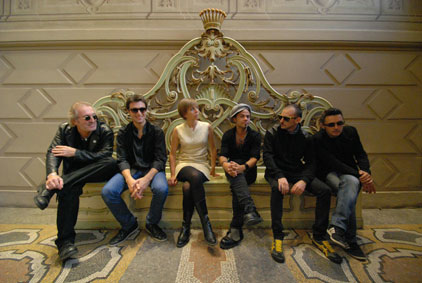 I feel awe talking to SYNDONE as a unique sounding band. Unique in how they teleport us back to the 60s heart of prog! Of course this time with a crystal clear hi-fi sound! How do you like this atmosphere?
I feel awe talking to SYNDONE as a unique sounding band. Unique in how they teleport us back to the 60s heart of prog! Of course this time with a crystal clear hi-fi sound! How do you like this atmosphere?
We’ve always really liked this atmosphere of Syndone; it is mid-way between the tradition and the future. This is important because it was in the original idea of the band: making a modern prog music but respecting its ’70ies history. It’s important to know where this music come from so we think, with our new album Odysséas” we hit the spot.
Please introduce SYNDONE band and its members for our readers.
Nik (keyboards, composer and Syndone founder):
I founded Syndone in 1989 with the idea to create a progressive band in ELP style. We were a power trio with drums, bass and keyboards. People still identifies me as the leader of this band also because I wrote and arranged all the songs of the first two albums, I was the singer and the front man of the group and I really put together the band in order to play live. I was the one much involved of us three!
Anyway… I had many songs in my mind at that time and I wanted to put them down in an album quickly. In late 1980 there was, in Italy, a sort of progressive style’s revival, so Crovella of Electromantic music contacted me to recording an album, a “new-prog” album, as they called at that time: that was “Spleen”. Two years later “Inca” was released”.
We wanted a name that would evoke all together “Sacredness”, “Turin”, ”Spirituality” and “Scored Grooves” (like an old vinyl LP) so I thought of SYNDONE, with the “Y” to distinguish it from the famous relic and make it International at the same time, without being blasphemous. This name in fact immediately evokes Turin in any part of the world.
In 1994 the band split off due to reasons within the group and each of the musicians will follow different personal paths.
After eighteen years the band returns to the scene as a sextet with a new line up.
The new musicians are now: RICCARDO RUGGERI (vocal/acoustic guitar, lyricist), MARTINO MALACRIDA (drums), MAURINO DELLACQUA (bass, taurus bass), MISS MARTA CALDARA (vibraphone, keyboards), GIGI RIVETTI (piano, minimoog) and NIK COMOGLIO (hammond, juno dist., piano, keyboards, compositions)
Do you have a special approach in choosing concepts behind your albums? How it has been for Odyssey in particular?
Rik (singer, lyricist):
No, I think there’s not a special approach. Mainly I’m inspired from the music we’re composing and often the story jumps out by itself. With Odyssey, the goal was to talk about a new point to understand the “journey”. I was thrilled to write about the travel that it’s no more discovering new lands but getting new eyes, as Marcel Proust has quoted. So it was spontaneous and familiar to me starting from the Homer’s tale which is the very book of the travel itself.
Which comes first in your composing process; the concept or the sounds?
Nik: First of all there always comes music, then we progress with lyrics that will be changed and developed during the whole recording process. That’s important for us because Rik uses his voice as an instrument; so the right choice of a word could really modify the whole sound.
A sextet band, with such a flawless recording for all instruments and vocals! Please tell us about recording process of Odyssey.
Nik: I always tried to be original.
When I have to compose music my goal is always to make it different from other music in circulation whatever the style I have to deal with.
So all must start from composition: every part of our music is codified in a score (at least the obbligato parts); then when the full score is completed we play the extracts parts on the real instruments beginning from the rhythm section. After that, we play all the keyboards, vibraphones, acoustic guitars etc. for the main arrangements, which includes to recording the orchestra if needed, and the first raw singing. This keeps the album into a semi-defined status in which anything could still happen. This semi-ended status it’s important for checking the lyrics and testing the global sound and the balance of songs of the record. Then the solo comes, and the last fine arrangements. We generally let the vocal session at the end because it is the most important thing. Then we mix the whole tracks and finally we can mastering the album.
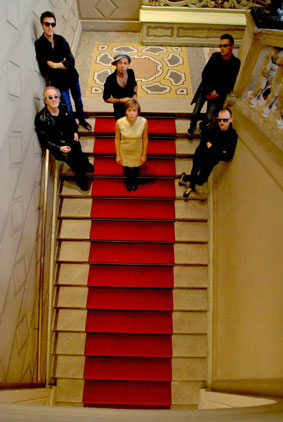 Could you explain us the Odyssey art cover? Praying crow-headed hermits? What is that the symbol on the rock?
Could you explain us the Odyssey art cover? Praying crow-headed hermits? What is that the symbol on the rock?
The Odyssèas’s front cover is a picture of an italian surrealist painter named Lorenzo Alessandri, and the title of this opera is: “A Oriente” – oil on canvas – 1979.
This is a very impressive painting which really evokes Homer’s Odyssey and the theme of the journey as one of the most deep humanity’s targets.
In prog music the art work is very important because it gives immediately the mood of the album you are going to hear. So I think the album cover must always underline the concept inside the music.
This picture of Alessandri has in itself a melancholy and a strong yearning for the infinite; the three “beaked characters” (or “Bedu,” as he called them, the painter) seem concentrated to a final end, but between them they seem to be psychically disconnected. As we know from Alessandri’s memories they are three monks praying near a lake and the symbol it is a constant sign of his opera.
What equipments you use for keyboards? Your keyboard sounding is so diversified.
Nik: I generally use vintage kbds in Syndone’s records (Rhodes and Wurlitzer electric piano, Honher Clavinet, Minimoog and Hammond organ) and a lot of analogical vintage machines. I think it is important for protect the tradition of this genre, as said over, but treating them with new effects and recording with new generation’s microphones. I personally created all the kbds’s sounds of the albums. I’ve never used presets or stuff like that, so that our sound is easy recognizable. Also the idea not to use electric guitars takes parts in making our sound particularly. I’m proud of it.
Mr. Marco Minneman’s drums sounds astounding! Tell our readers more about his involvement in the project.
Nik: My ex – colleague Francesco knew Marco after having participated to one of his drum clinics in Germany. So, as for Ray Thomas, I contacted Marco asking him to recording his drums on Odysséas. First he told me that he wanted to listen to the project midi files and then he accepted. After having recorded his drums on the album he wrote me that it was fun working on our music. The same iter was for John but it was for only one track. He played his flute in an amazing way and the whole sound of the song became richer and quite more interesting.
As I said above it has been a job managed from distance. I sent the files audio to Marco and he recorded his drums on it.
Then he re-sent to me all the recorded tracks in 48K/24bit audio files ready to put them onto the mix.
Marco’s drumming is very actual and fresh and I think it was basic for Odyssèas’s final sound. For me he is one of the best modern drummer of the world by now.
How it is like to be a prog musician in Turin?
It’s hard to say it. Progressive rock is often considered a borderline music and I personally feel myself a bit misunderstood. To people this style either doesn’t like or doesn’t understand it and this is the truth; it was better in the “age d’or” (in the mid of ‘70ies) in which to be a progster meant to be an innovator, to be among the vanguard. It’s a cultural loss problem.
Does your music support you financially or do you support it?
For the moment we’re concentrated and deeply involved in promoting this band as much as we can, so it’s hard to say we are financially self-sufficient as a group, but the times they are a changin’. We really trust in the power of our music!
Is it possible to explain us in words your experience while composing or performing?
Writing music is completely different from performing music. Composing is a thing you must do on your own, often staying in isolation; the musical idea becomes a song or a tune first in your brain through your musical sensibility and your musical background. So it’s hard to work together a partner (at least for me) in this particular time. When the most part of the music is done, only then I try compare myself with the ideas of my colleagues.
On the contrary, performing must be a “whole band experience” instead. On stage we are six elements trying to think with a one mind, to make the music more powerful and straight exciting than ever. Even as single persons (when we are out of the stage) we often discover us to think the same things. When a band succeeds in this, the show will be magical and people down the stage will be much involved at its deeper level, which is the musical level.
Where our readers can buy your music?
Everyone can find our records here: www.altrock.it Or at the stage where we’re performing live.
How can we see you on stage?
Next gigs are: Teatro Govi 01/17/2015, Genova), Biella (mid March), F.I.M (Genova, first of May), maybe Progsud (Marsiglia, first of May), Gouveia (Portugal end of April), Turin (end of March). Anyway, everyone can find all the news about Syndone on our own FB page: https://www.facebook.com/pages/SYNDONE-progband/188463544523800
Don’t be secretive! Do you have any idea of your next project yet?
Yes, we discussed the primary lines of a Syndone new album just this month. Rik has already choosen a very cool concept story to work at, but I cannot speak to about it yet. We’re also looking for a new sound for this record because the goal is to go further Odyssèas, that’s is a no easy thing to do. But it will be a real challenge and we’ll find out the way to do it still better.
Thanks for your time!
(*) Salim Ghazi Saeedi is an Iranian composer and guitarist mostly known in avant-prog and rock in opposition genres. www.salimworld.com
41
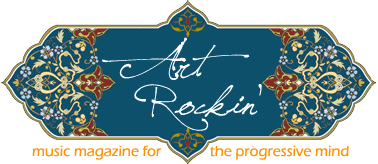
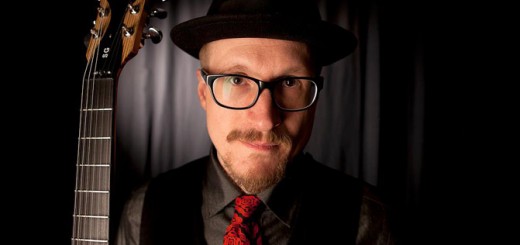
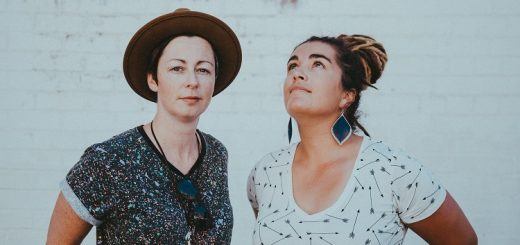
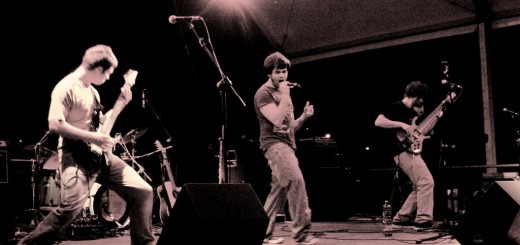

Recent Comments